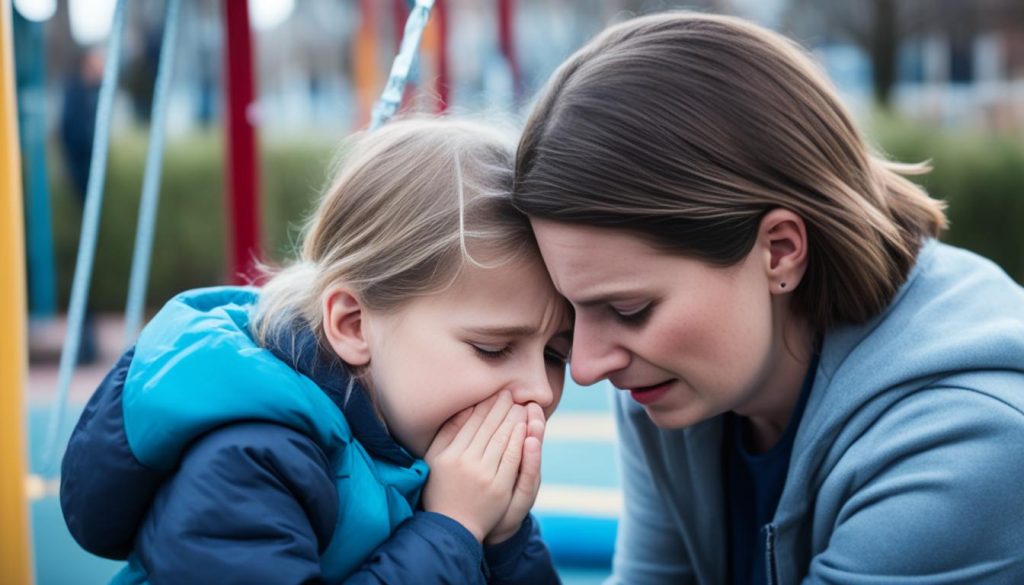Have you seen your child comfort a crying friend or share a favorite toy without being asked? These moments fill you with hope for their future. They show the kindness and compassion growing in their hearts. As a parent, it’s fulfilling to see your child understand empathy and respect.
Raising kind and compassionate kids is key to a caring society. It starts with how empathy grows over time. By age three, kids start to notice others and understand their feelings a bit. By age four, they can apologize if they hurt someone. By five or six, they share better and talk about what kindness means.
These milestones show empathy grows naturally but needs nurturing. As a parent, you guide your child through these stages. By modeling kindness, you teach them for a lifetime of compassion. So, set boundaries, guide them, and celebrate their kindness to instill these values.
Key Takeaways
- Empathy develops progressively in children, with significant milestones at ages three, four, and five or six.
- Modeling positive behaviors and actions is crucial for fostering respect, empathy, and positive growth.
- Encouraging open communication and active listening helps children understand that their feelings and the feelings of others matter.
- Teaching children to recognize and understand facial expressions can enhance their empathetic abilities.
- Setting boundaries and explaining their importance helps children understand the need for respectful and kind behavior.
By focusing on these stages and actively teaching empathy and kindness, you help raise a caring generation.
Understanding the Nature of Kindness and Compassion in Children
Children show kindness and compassion from a young age. Studies show that even infants share toys or comfort others in distress. These acts of kindness start early, around 8 months, and grow as they get older.

Natural Compassionate Tendencies in Young Children
By 1 to 1.5 years, kids start helping with tasks like getting items for adults. This shows they naturally want to help others. Surveys with 5-6 year olds in the UK show they feel empathy and understand fairness.
The Role of Developmental Stages in Empathy
Knowing how empathy grows in children is important. By 2 years old, kids start to understand and feel others’ feelings. This is a big step towards being emotionally smart.
By 4 years old, kids often say sorry on their own and care about others’ injuries. This helps their mental health. Encouraging creativity helps them express feelings and see things from others’ views.
Modeling Positive Action for Your Children
Being a positive parent means being a role model. When you live by the values you want your kids to have, like being kind and honest, you’re showing them modeling positive action. Studies show parents have a big impact on their kids’ values and attitudes. This affects everything from their relationships to their health and tech use. By being a positive example, you give your kids a blueprint to follow.

The Importance of Leading by Example
Leading by example means more than just being nice. It’s about treating others with respect every day. For example, eating healthy or exercising can inspire your kids to do the same. Research says kids often take on their parents’ values, especially if they’re close. This shows how crucial it is to act positively to help your kids be independent and share your values.
Everyday Acts of Kindness
Acts of kindness can be big or small, like opening a door or helping out in the community. Talk to your kids about why you acted kindly and how it made you feel. This makes kindness seem normal and helps them understand and adopt it themselves. Real World Peaceful Parenting has helped thousands of families worldwide by showing how consistent actions and talks can make kids kinder.
| Aspect | Impact on Children |
|---|---|
| Healthy Lifestyle Choices | Encourages adoption of similar habits |
| Respectful Behavior | Empowers them to build respectful relationships |
| Positive Attitude Towards Learning | Inculcates a love for education |
| Safe Habits with Substances | Shapes their attitudes towards alcohol and drugs |
| Technology Usage | Forms their approach to digital behavior |
Using discipline that teaches instead of punishes is a great way to show how to handle problems and mistakes. By living these principles every day, you’re not just helping your kids be independent. You’re also teaching them about empathy, respect, and responsibility.
Encouraging Emotional Intelligence in Children
Teaching emotional intelligence to kids is key for their growth and success. It helps them manage their feelings and understand others. This leads to a kinder and more caring world. Parents can help by teaching empathy and understanding different views.
Teaching Empathy Through Storytelling
Storytelling is a great way to boost emotional smarts in kids. Reading books with diverse stories teaches empathy and diversity. Kids learn to feel for others by connecting with characters and their stories.
This approach also helps kids deal with tantrums by showing how to behave better. Talking about stories’ lessons encourages kids to see challenges as chances to grow. It helps them develop a positive mindset.

Helping Children Understand Different Perspectives
To grow empathy and emotional smarts, kids need to see things from others’ viewpoints. This means talking about real-life situations and how others might feel. Activities like role-playing and watching diverse media help kids understand human feelings better.
This kind of learning is good for kids’ mental health and relationships. It also helps them in the future. Research shows that emotionally smart kids do better in life and work.
Teaching kids about emotions also makes family life better. An article from Supporting Your Child’s Mental Health says empathetic parents raise emotionally strong kids. Talking openly and letting kids share feelings is key to these skills.
By focusing on emotional smarts, parents help kids through life’s ups and downs. This builds empathy and understanding of diversity. It also helps with tantrums and growing a positive mindset. This leads to a kinder and smarter future for everyone.
Parenting and Raising Kids with Kindness and Compassion
Using compassionate parenting can deeply affect your child’s emotional growth. It’s key to stay calm during tough times, like when they throw a tantrum, to show them how to behave well. By talking well with your child, you build a strong relationship and teach them important life skills.

Teaching empathy and responsibility is key in positive reinforcement parenting. For example, talking with your kids and solving problems together, like in Denmark’s “Klassen Time” for kids six and up, helps them feel others’ feelings deeply. Reading books like Harry Potter also helps them understand different lives.
Studies from the National Institute of Child Health and Human Development show that kindness helps kids feel more empathetic. This way of parenting means not letting screens take over real-life talks. Setting limits on screen time helps focus on activities that build emotional smarts and caring for others.
Schools also play a big part in teaching kids to be kind. Programs that focus on kindness, solving problems together, and understanding others are key. These activities help kids deal with tough feelings and relationships, making them more resilient.
Using positive reinforcement parenting by praising kind actions and giving rewards can encourage kids to be more caring. But, it’s important not to rely too much on rewards. True empathy should be part of who they are.
Introducing your child to different cultures and values helps them see the world more broadly. This reduces bias and makes them more open to others. By talking with your child in a kind but clear way, you help them grow in a caring and supportive space.
Building Respect and Empathy within the Family
Creating a harmonious family means building respect and empathy. These are key to strong family ties. Empathy helps each family member understand and value each other’s feelings.
Promoting Positive Family Interactions
A united family needs positive interactions and good communication. Parents should show how to work together, be kind, and empathetic. This helps kids learn to handle sibling rivalry well.
Doing things together, like eating meals or playing games, helps build respect and empathy. It also helps balance work and family life.
A teacher in a first-grade Montessori class showed how to talk about empathy after George Floyd’s death. They taught about accepting and celebrating differences. This taught kids about empathy, diversity, and respect.
It’s important to value and understand each family member’s unique experiences. The Center for Children and Youth and Common Sense Media offer tips on this. Dr. John Gottman’s book, “Raising an Emotionally Intelligent Child,” also stresses the importance of empathy.
Addressing Conflict with Compassion
Conflict is normal in families, but solving it with kindness can help everyone grow. Empathy is key in solving conflicts. It helps family members see their parts in issues and apologize genuinely.
When dealing with sibling fights, it’s key to look at the feelings behind the fight. Helping kids share their feelings and see each other’s views helps. Being kind encourages them to see conflicts as chances to grow closer, not just fight.
Building respect in the family means teaching empathy and appreciation. This helps kids deal with sibling rivalry and balance work and family life. It leads to a respectful and healthy home.
Teaching Responsibility and Accountability
Teaching kids about responsibility and accountability early helps them build strong social skills and trust. Parents often skip letting kids face the results of their actions, like hitting a sibling or not cleaning their room. Waiting to teach responsibility in middle school is hard because kids resist and it’s tough to learn.
Setting consequences for actions teaches kids to be accountable. Waiting to give consequences helps them handle bigger responsibilities later. Starting to teach responsibility early helps kids manage big tasks in their teens and beyond. Being consistent and clear about expectations and consequences is key. Don’t make excuses for your child’s actions to encourage them to take responsibility.
Incorporating Acts of Service
Adding acts of service to your child’s daily life teaches them the value of helping others. Simple tasks like donating toys or baking cookies for shelters show them how their actions help others. These activities help kids see how they can make a positive difference, growing their caring nature.
Volunteering as a Family
Volunteering together as a family teaches kids about responsibility and community. You can join local events, clean parks, or help at food banks. These activities are great for talking about how money is used and managed. It’s a hands-on way for kids to learn about teamwork and responsibility.
| Action | Teaches | Benefit |
|---|---|---|
| Donating Toys | Compassion & Generosity | Instills a Habit of Giving |
| Making Cookies for Shelters | Service-Oriented Behavior | Community Engagement |
| Volunteering at Food Banks | Teamwork & Cooperation | Enhanced Responsibility |
| Cleaning Up Parks | Environmental Awareness | Improved Locality |
| Financial Literacy Activities | Resource Management | Informed Decision-Making |
It’s important for parents to be good role models for their kids. Don’t use shame to teach accountability; it can stop kids from owning up to their actions. Instead, make a supportive space where learning from mistakes is seen as part of growing up. By doing acts of service and volunteering together, you’re building a strong foundation of responsibility, accountability, and compassion in your kids.
Creating an Open and Safe Environment for Communication
Talking well with your child is key to making a safe space for sharing thoughts and feelings. It also helps grow their creativity and strengthens your bond. To do this, you need to make sure they feel heard and important.
The Role of Active Listening
Listening well is very important for a happy home life. When you focus on your child and ignore your phone or work, you show them their feelings are important. This kind of listening builds trust and helps you understand their feelings better.
- Active listening shows care and interest.
- It helps parents better understand their children’s lives.
- Parents should model good listening practices themselves.
Encouraging Open Dialogue about Emotions
Talking about feelings is key to a safe place for sharing. When kids feel safe, they share more about their thoughts and feelings. Also, when you talk about your feelings, you teach them it’s okay to do the same.
Here are some ways to talk more openly:
- Set aside time for family talks, like during meals.
- Use simple words your child gets and answer them well.
- Support what they say with positive words and understanding.
Being creative is also helped by talking openly. When kids feel safe sharing their feelings and thoughts, they’re more likely to be creative and try new things. Make your home a place where they feel free to be creative and share their feelings.
| Statistic | Insight |
|---|---|
| 90% of time with infants is loving | Strong early connections are essential for emotional security. |
| 90% of time with toddlers corrects behavior | Balance correction with positive, open communication. |
| Children’s emotional needs unmet | Can lead to developmental and relational issues. |
| Empathy from parents | Creates a sense of safety and security. |
Monitoring and Discussing Media Influences
Parenting in today’s digital world is tough, especially when it comes to managing screen time. Studies show that too much screen time can harm kids, making them sleep poorly and act out. It’s a big worry for parents.
Research in Pediatrics (2017) says parents play a key role in fixing this. Talking with your kids about what they watch helps guide them towards kind and understanding media. This way, you help them be independent but keep them safe from bad content.
Here are some key findings:
- Sleep Med. (2016) showed that TV affects how well preschoolers sleep.
- PLoS ONE (2013) linked mobile phones, lead levels, and ADHD symptoms.
- Int. J. Environ. Res. Public Health (2018) found links between screen time and behavior issues in young kids.
A study in Appl. Physiol. Nutr. Metab. (2012) stressed the need to watch what kids watch. Watching the right amount of media can help kids stay healthy and adjust better, as seen in J. Paediatr. Child Health (2017) and J. Pediatr. (2018).
Setting limits and using controls on devices is key to a healthy media life for kids. This way, they watch stuff that teaches empathy and good behavior. Being active in the digital age means watching what they watch and talking about it. This helps kids grow up independent and happy.
| Study | Key Finding |
|---|---|
| Sleep Med. (2016) | Impact of television on sleep quality in preschoolers |
| PLoS ONE (2013) | Correlation between mobile use, blood lead levels, and ADHD symptoms |
| Int. J. Environ. Res. Public Health (2018) | Associations between media use and behavioral difficulties |
In conclusion, keeping an eye on media and talking about it with your child is crucial. It shapes their growth and helps them have healthier, kinder interactions.
Conclusion
Raising kind and compassionate kids takes a lot of effort. It’s important to build a strong bond with your child. This helps them understand others’ feelings and manage their own emotions better.
When parents act kindly, kids learn to do the same. Spending quality time with your kids and talking openly helps them feel safe to share their feelings. This is key for their emotional growth.
How parents act affects their kids’ minds and feelings. Being positive and setting clear rules helps kids control their emotions. Giving them chores teaches them about responsibility and gets them ready for the future, like starting kindergarten.
Playing outside is great for kids. It helps them make friends and stay healthy. It also helps them become more independent.
Raising a child in the U.S. is expensive. So, it’s important to focus on their emotional and social health. By teaching empathy, kindness, and open communication, you help your kids face life’s challenges. They’ll also be ready to help others and make a positive impact.
FAQ
What are some natural compassionate tendencies in young children?
How do developmental stages play a role in developing empathy?
How can parents model positive action for their children?
What are some everyday acts of kindness that parents can incorporate?
How can storytelling teach empathy to children?
What is the importance of helping children understand different perspectives?
How can raising kids with kindness and compassion be achieved?
What are ways to promote positive family interactions?
How can volunteering as a family teach responsibility and accountability?
What is the role of active listening in creating an open communication environment?
How important is it to monitor and discuss media influences with children?
This post contains affiliate links. If you click on a link and make a purchase, I may earn a small commission — at no extra cost to you. Thank you for supporting this blog and helping me keep the patterns free! Read the full Affiliate Disclosure & Transparency.
